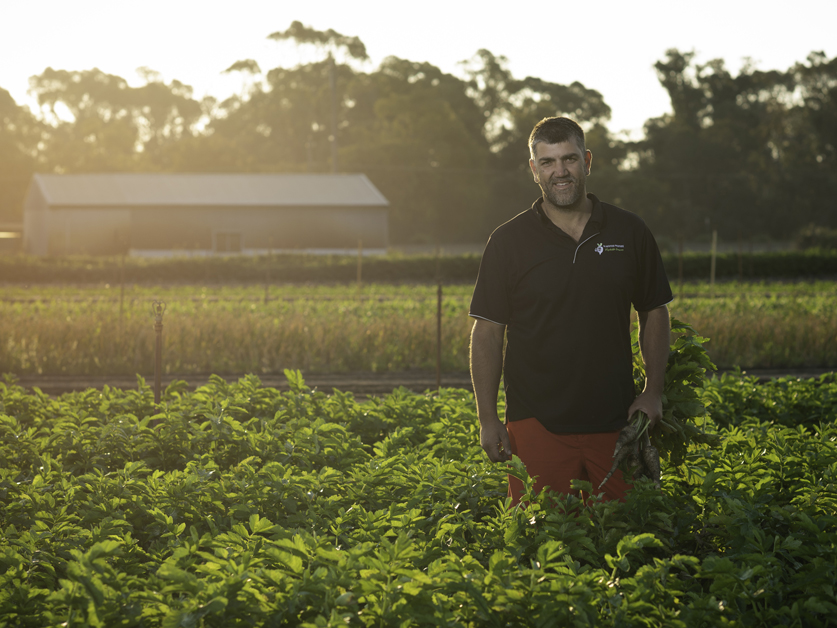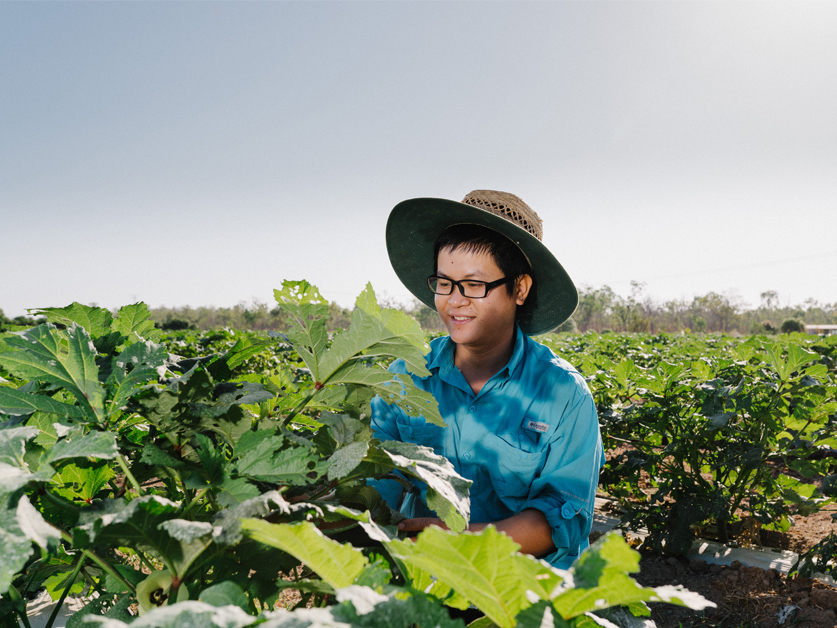
Kevin Hoang: Establishing a successful career
21 November 2019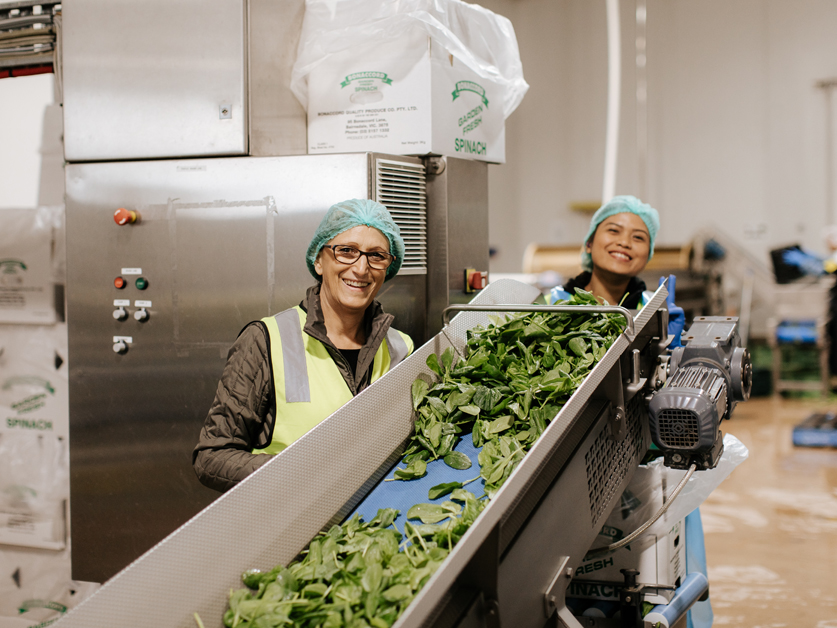
Passion and commitment leading to horticulture success
21 November 2019Vegetable growing is more than throwing seeds into the soil and expecting them to grow. It is a livelihood for many, including Western Australian grower Paul Glavocich. In this edition, Paul speaks to Michelle De’Lisle about his growing operation and its challenges, his role at vegetablesWA and how a benchmarking project has assisted him in recent business decisions.
Fast facts
Name: Paul Glavocich
Location: Wattleup, WA
Works: Glavocich Produce
Grows: Parsnips, kale and silverbeet (all year-round); garlic, sweetpotato (seasonal crops)
Paul Glavocich understands that making tough decisions is vital to maintaining a profitable and sustainable vegetable growing operation. The second-generation grower currently oversees a 10-acre property in Wattleup in Perth’s southern suburbs, but until recently Paul owned another farm at Gingin in the city’s north. However, after reflecting on the Gingin growing operation and its viability, Paul decided to concentrate on the Wattleup property that was started by his parents, Paul and Katy, over 30 years ago. Paul and Katy still work on the farm, along with a couple of permanent staff.
Currently, Paul grows parsnips, kale and silverbeet all year-round, with garlic and sweetpotatoes grown as seasonal crops.
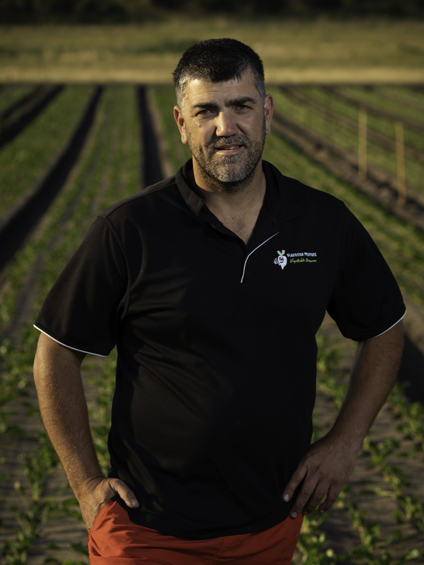
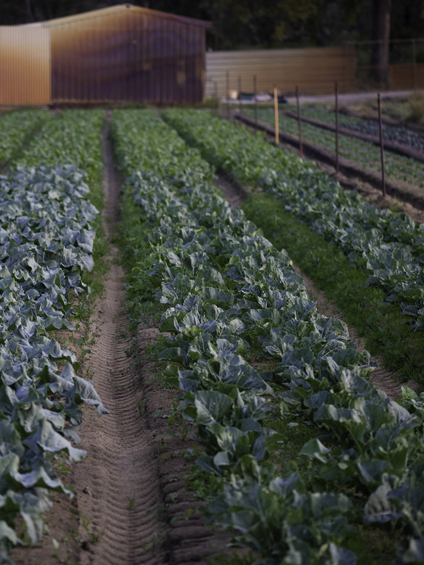
Combating challenges
Like all growers, weather is a big issue for Paul, particularly with leaf lines. However, he has looked at ways to minimise the risk to those crops.
“I have cut back production a bit in the times when the weather can be an issue, and then grow the other crops that can handle those conditions. I grow a bit more of my root crops during wintertime, when you have damaging winds and potential hail. You can’t always predict the weather, but you try to, to the best of your knowledge,” Paul says.
Water is another challenge and so are the rising costs of operating a farm.
“These are issues that people have got to learn to work with,” Paul says.
Furthermore, there is the challenge of urbanisation in the inner-city suburbs where growers have been operating for generations. This is causing them to look further afield which Paul says is understandable, but there are roadblocks.
“People are buying land but are being told they can’t clear it for horticulture. The Government’s putting agriculture in the same category as developers. How are we meant to grow the industry if the land that the farmers used to have that was closer to Perth is getting taken away for residential areas? People are moving further out of Perth and then they’re buying this land and the Government’s saying no (you can’t clear it), that’s native vegetation,” Paul says.
“How is the Government expecting industry to get ahead? I think there should be a bit of forgiveness for people who are feeding the country. We’re using the land for productivity and these are only areas that we have, because people are being pushed further out from the CBD. “It’s really hard to find farms close to Perth. You’ve got to start moving up to Gingin or down to Myalup, which has been the case for years.”
“These are issues that people have got to learn to work with"
Advocacy activity
To ensure his voice is heard on issues affecting the Western Australian vegetable industry, Paul joined the vegetablesWA Committee of Management just over a year ago. Meetings are held every three months, where these and other topics are discussed between growers and industry members. Paul joined the Committee so he can have an input in order to benefit the vegetable industry, and he encourages other growers to do the same.
“If growers want to better the industry, then the best way is to get involved with the body that supports it. Instead of sitting on the fence, put your voice out there. That’s what vegetablesWA is there for. Everyone’s welcome to speak up.” Paul also encourages vegetable growers to attend networking events. “I know being a grower can mean you are time-poor, but even if you just go to one of the networking events once every three months or six months, you can be involved,” he says.

Getting down to business
Over the past two years, Paul has been involved in Vegetable business benchmarking (VG17000), a strategic levy investment under the Hort Innovation Vegetable Fund. Led by vegetablesWA, this project is engaging with Western Australian vegetable growers like Paul to identify production and financial benchmarks and to uncover the drivers of best practice performance. Paul is an ardent supporter of the benchmarking project.
“I’d encourage Western Australian growers to get on-board with benchmarking because it’s helping people figure out what it’s really costing them to run their business and getting average costs for growers who produce the same lines as you,” he says.
“Being involved has given me a view on where my costs are in my business and the crops I was growing, and the money I was really making. Look at the crops that you’re growing and why are you growing them. Are they profitable or are you over suppyling, which is not making them profitable?
“Just because you need to make a hard decision on your business, it doesn’t mean that it’s actually bad. Selling my Gingin farm was a hard decision that I had to make, because it was going to better my business. The crops that I was doing weren’t suitable. I think benchmarking can help people make the right decisions and know where their business is heading.”
Additionally, to maintain disease resistance and ongoing sustainability of the farm, Paul engages in crop rotation practices and has implemented an irrigation and fertilising program that can be used remotely from his phone. He has installed biosecurity measures for anyone entering the farm, and is also a pilot member of the current EnviroVeg program, an industry-led initiative that promotes best management techniques by providing resources, support, engagement and a pathway to certification recognition for vegetable producers. A growing passion Despite the challenges and the tough decisions that have accompanied him over the years, Paul is still enjoying being on the farm.
As the business owner, Paul runs the day-to-day operation and he still gets his hands dirty out in the field.
“I’m quite happy at the moment with the way my operation is running. It’s only a small operation, but I’m happy with the customers who I deal with and the lines that I’m growing,” he says.
“I like watching the plants grow and their progress. Every day you know you’re doing something productive, and I lead a good lifestyle. You are your own boss. I can see that I’ve planted something, spent an amount of time growing it and then I’ve sold it. To me, that is rewarding.”
This grower profile first appeared in the leading magazine for the Australian vegetable industry, Vegetables Australia. If you’d like to subscribe to receive a new edition of Vegetables Australia in your mailbox every two months, use our online subscription form!
Photography credit: Roman International Photography

